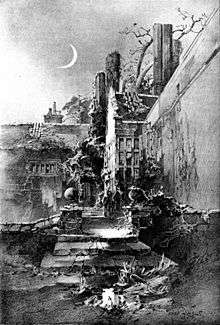Hobgoblin
 Shakespeare identifies Puck as a hobgoblin | |
| Grouping |
Fairy Goblin |
|---|---|
| Region | Europe |
A hobgoblin is a mischievous spirit, typically appearing in folklore. Shakespeare identifies the character of Puck in his A Midsummer Night's Dream as a hobgoblin.[1]
Etymology
The term "hobgoblin" was at first two words Hob Goblin, with Hob being the first name, and Goblin being a defining surname. One interpretation derives "hob" from the Welsh, signifying "hearth", and therefore, a household fairy. The earliest instance of the word can be traced to around 1530, although it was likely in use for some time prior to that.[1]
"Hob" is simply a rustic name for the countryside goblin, "a piece of rude familiarity to cover up uncertainty or fear". "Hob" is generally explained as a nickname for "Robert".[2]
Folklore

Hobgoblins seem to be small, hairy little men who—like their close relative, brownies—are often found within human dwellings, doing odd jobs around the house while the family is lost in sleep. Such chores are typically small deeds, like dusting and ironing. Often, the only compensation necessary in return for these is food.
While brownies are more peaceful creatures, hobgoblins are more fond of practical jokes. They also seem to be able to shape-shift, as seen in one of Puck's monologues in A Midsummer Night's Dream. Robin Goodfellow is perhaps the most mischievous and most infamous of all his kind, but many are less antagonizing. Like all of the fae folk, hobgoblins are easily annoyed. They can be mischievous, frightening, and even dangerous.[3] Attempts to give them clothing will often banish them forever, though whether they take offense to such gifts or are simply too proud to work in new clothes differs from teller to teller.
In literature
In John Bunyan's hymn "To be a Pilgrim", the hobgoblin is coupled with "a foul fiend" as two monstrous beings who try and fail to "daunt the Pilgrim's spirit".
The term "hobgoblin" has grown to mean a superficial object that is a source of (often imagined) fear or trouble. Probably the best-known example of this usage is Ralph Waldo Emerson's line, "A foolish consistency is the hobgoblin of little minds", from the essay Self-Reliance.[4]
See also
References
- 1 2 Scott, Charles C.P., "Hob Goblin", Transactions and Proceedings of the American Philological Association, Vol.26, American Philological Association, 1895
- ↑ Scott, Charles C.P., "Hob", Transactions and Proceedings of the American Philological Association, Vol.26, American Philological Association, 1895
- ↑ Briggs (1979) p.32 p.100
- ↑ "Self-Reliance". Emersoncentral.com. Retrieved 2013-09-09.